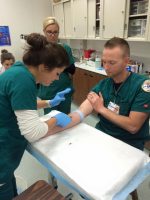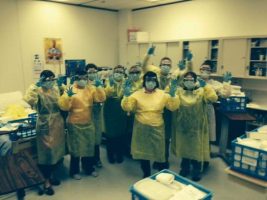Associate to bachelor’s: UAA’s School of Nursing is answering Kodiak’s health care needs
by cmmyers |
In 1977, Margie Mete was a young nurse who had recently graduated with her nursing diploma. Like many young nurses of her time, she entered the health care industry when there was a nationwide nursing shortage. Despite the shortage and desperate need for nurses, she and her peers were strongly encouraged to pursue their Bachelor of Science in Nursing (BSN) degrees. She acquiesced and earned her BSN a few years later. It's a sentiment that's been repeated by health care providers throughout her 40-year career as a nurse, and as an associate professor of nursing at the UAA School of Nursing's (SON) Kodiak Outreach Site, a message she's passed on to her students.
"What I've been telling every student that's been coming through my program since 2002-this is not the end when you're done with this degree," said Mete. "You need to keep going on for your bachelor's degree, because it's going to be mandatory at some point."
Fast forward to 2017 and that time has come. The Kodiak Outreach Site is going through a year-long change to transition of its associate degree program to a baccalaureate degree program.
Mete said the decision to shift the program came largely from Kodiak's health care leaders who run the local hospital and health clinics. She added that, more hospitals across Alaska and nationwide are requiring nurses to have their BSN, and opportunities for nurses with only an associate degree are becoming slimmer. Mete said many hospitals will choose to hire a brand new nurse with their BSN over a nurse with his or her associate degree.
Winds of change
In Anchorage, UAA's SON program is undergoing changes as well-hoping to better address Alaska's health care industry needs and graduate nurses that will be prepared to enter the workforce and pursue a nursing career in state.
The recent changes came with new SON Director Marianne Murray and Jeffrey Jessee, Dean of the College of Health and Vice Provost of Health Programs. They have committed to a two-year plan to reassess the SON's programs, meet with health care industry leaders statewide, help satellite campus nursing programs meet their community's needs and expand the SON's programs overall.
It's a big undertaking, with a short deadline, but one that Murray and Jessee are passionate about taking on.
"Every time an Alaska health care provider has to hire a traveler-at great expense-it's a lost opportunity for the University of Alaska, and the College of Health in particular, to have produced an Alaskan that was qualified to fill that job," said Jessee. "We're on task to close that gap."
Jessee also said it's about ensuring the state has health care and nursing professionals who are local Alaskans and understand the state's unique cultural and demographic diversity. The expansion will help ensure nursing jobs statewide are being filled by Alaska's graduates.
Murray and Jessee spent the summer putting their plan in motion, starting their statewide tour in Southeast and working their way north. Kodiak was on their list.

A UAA School of Nursing student at the Kodiak Outreach Site practices administering an IV flush under the watchful eye of her instructor. (Photo courtesy of Margaret Mete)
After meeting with leaders in Kodiak, Murray and Jessee realized they had to make a major change to the outreach site's associate program. They needed to move the current associate degree program to a BSN-and quickly.
"They [Providence Kodiak Island Medical Center (PKIMC)] wanted a baccalaureate program and they also wanted more graduates," Mete said. "They have these vacancies at the hospital they have to fill with travelers a lot of the time. It's costly for them."
Jessee said PKIMC expressed frustration over the SON producing a cohort only every two years. It was not enough. If the school could graduate a new nursing cohort each year, that would be most beneficial in filling much needed positions at their hospital.
To help fill the gap this school year, the Kodiak Outreach Site admitted a larger cohort of students and plans to graduate 10 nurses instead of the normal eight. This will help ease the community's nursing needs until the baccalaureate program gets underway next fall.
From associate to full-fledged BSN
Both Jessee and Murray recognize this is a big project-especially for one person-but are more than confident that Mete is up to the task. She has one year. The Kodiak Outreach Site will begin offering the BSN nursing program for the fall 2018 school year.
Luckily for Mete, she's not reinventing the wheel. She has a well-established program that already exists in Anchorage, with many resources at her disposal to implement the BSN degree program in Kodiak.
Mete said that Murray and Jessee have agreed to let her admit a new cohort every year, rather than the current every-other-year design. She'll still be accepting eight students each year, which she says is the standard size for a cohort, but the Kodiak Outreach Site will soon be graduating more nurses than ever before, and ones with the required BSN.
"It meets the community's needs more to have all the graduates be baccalaureate prepared," Mete said. "We really want the people that live in this community to go through our program and work in our hospital, because they stay here. They fill that community need and know the patients."
Another big reason for transitioning the outreach site's nursing program and opening a wider door for more cohorts? Better health care for the community. Mete said research has shown that when health care providers, like nurses, reflect the diversity of the patient population, they're better able to meet the health care needs of the patient.

Hands up in the isolation lab with UAA School of Nursing Kodiak Outreach Program students. (Photo courtesy of Margaret Mete)
"We have a big Alaska Native and Filipino population here and we don't have that reflected in our nursing staff," Mete said. "The ratio of Filipino nurses to the ratio of Filipino patients-or Alaska Native patients-are not accurately reflected in our staff."
She said in addition to transitioning the nursing program from associate to baccalaureate, they are working to encourage more diversity in their program with Filipino and Alaska Native students, so patients have that representation when they come to PKIMC and smaller health care clinics on the island.
Other changes include adding support services for students who may be struggling with the program academically or financially, so the school can help them achieve success and complete their degree program.
Kodiak, expansion and the future of SON
Kodiak is not the only outreach site on the list for program changes and expansion. There will be more changes in the coming months as Murray and Jessee continue traveling this year, heading Southwest and North to meet with local health care leaders in communities across the state, and assess what the SON can do to help support their efforts in providing quality health care for Alaskans.
"We're meeting all of these various goals by going to the community, collaborating with folks and coming up with a plan that will better meet the community's needs, the students' needs and our providers' needs," said Jessee. "I've worked in Alaska for a long time and know that talk is cheap and you gotta deliver-that's the next challenge."
Jessee, Murray and Mete are up for the challenge. And the first big hurdle is getting Kodiak Outreach Site's new BSN program up and running. It's an exciting time for the school and Mete is honored to be a part of it. She's had a long career in nursing and has known for many years the importance a BSN degree has in her profession. She's happy she's part of that shift and that, ultimately, it will provide her corner of the state with nurses who are ready to step into jobs that will fulfill the health care needs of her community.
Written by Catalina Myers, UAA Office of University Advancement









